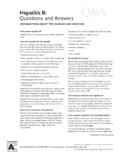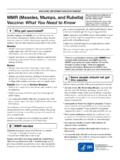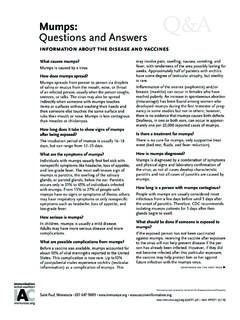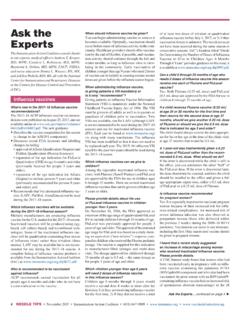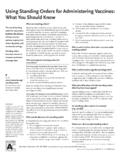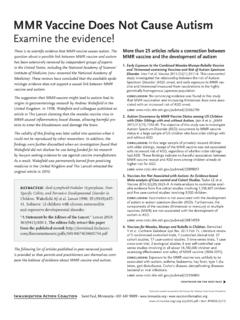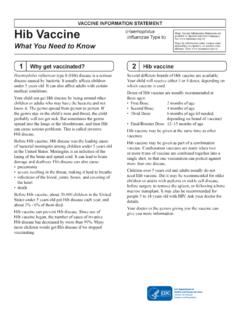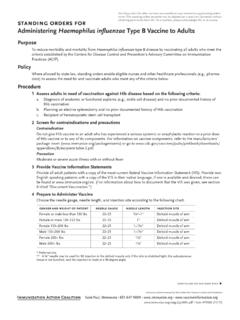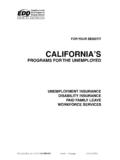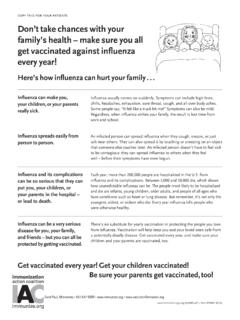Transcription of Clear Answers and Smart Advice About Your Baby's Shots by ...
1 QSaint Paul, Minnesota 651-6 47-9009 Item #P2068 (8/16)It s time to jump right into a hot topic you ll find in parent circles vaccines. Nothing seems to stir the blood these days more than a good ol fashion debate on vaccinating your child. And after the 2015 measles outbreak at Disneyland, the silent majority of parents who believe in vaccinations are far from head s up: since there is so much misinformation out there on vac-cines, you need to be armed with detailed, accurate information. And like the rest of this book, that is what you will get in this chapter. The information we provide is based on scientific evidence and solid peer-reviewed research.
2 Remember our mantra: show us the science! your child is too precious to make such important decisions on anything less. This chapter is not based on personal anecdotes, conspiracy the-ories, research done in people s basements (we are not kidding), or the crusades of B-list , before we get to our take on this debate, let s go back in time a bit. Well, more than a bit. How did the human race survive when other early humans didn t? Yes, making tools and finding food most efficiently played a big role. But here s another key element: we built civilizations. And we developed a sense of responsibility to our-selves and to our society.
3 Every time we respond to a tragedy in our nation whether it be 9/11, Hurricane Sandy, or the Boston Marathon bombing we are reminded of how we are not just individuals living in our own little worlds. It s part of our civic duty to lend a hand and take care of our neighbors. So, what s this pontificating have to do with vaccines? Again, it is our responsibility to work together as a community .. this time, the subject isn t terrorism or storms, but something that can be just as terrifying: infectious diseases. Consider a bit of history: in the 1890s, people would have seven or eight children in their families and only half of them would survive childhood.
4 Just go to an old graveyard sometime and look at the ages listed on the headstones. Many of the diseases that killed those children are now prevented by vaccination. It s a fact: vaccinations have increased the life expectancy of our nation s chil-dren. That s why our grandparents and parents embraced vaccines. Here s a crucial point: the key to a vaccine s success is that everyone in the community gets vaccinated. Vaccines won t work if a large number of folks just choose to opt out of the system and their respon-sibility. Please keep this in mind as you read About vaccinations. your decision (and every other parent s decision) affects your child.
5 And society as a whole. Germs are rather simple creatures .. they just look for a new person to infect. They don t play politics. reality checkThe concept of public health has been around since antiquity. Obviously, rulers had a vested interest in keeping their subjects healthy so they had a society to rule. Through the years, governments have been responsible for managing numerous programs. The most important advances in public health have been vaccination pro-grams, water purification, and waste disposal/sanitation systems. The only way for public health to work, though, is for all members of the community to follow the same came up with the idea of vaccinations in the first place?
6 It took centuries of observation as well as trial and error. (And some-times, error meant death.) The first real step was describing the disease, in this case, smallpox. Smallpox was a deadly disease that, historically, wiped out entire civilizations. The earliest descriptions can be found as far back as the ninth and tenth centuries among Turks. In fact, inoculation, or the infecting of a person with the disease in hopes of introducing a mild form and then creating immunity, was practiced first in Asia. In the 1700s an English aristocrat, Lady Mary Wortly Mon-tagu, was living in Constantinople and learned of the practice of inocu-lation (known then as variolation).
7 She had her son inoculated and subsequently, brought the practice back to England. At About the same time, an English country doctor, Edward Jenner, made an interesting connection: milkmaids who had been exposed to cowpox (a common disease in cattle at the time) never seemed to get smallpox infections during epidemics. He began to study the idea that vaccinating humans with cowpox virus would make them immune to smallpox. In 1798 he published a paper on his idea and called it Vacci-nation. Not to say, by the way, that Dr. Jenner s idea was accepted with completely open arms. In the nineteenth century there did emerge a group opposed to vaccination led by Mary C.
8 Hume. See, even the anti-vaccination lobby has been around a long time! Of course, in those days, you could be prosecuted for refusing to Answers and Smart Advice About your Baby s ShotsDr. Brown received her medical degree from Baylor College of Medicine in Houston, Texas; she did her pediatric residency at Harvard Medical School/Boston Children s Hospital. In private practice since 1995, Dr. Brown is perhaps best known as the coauthor of the 411 parenting book series Expecting 411: Clear Answers and Smart Advice for your Pregnancy, Baby 411, and Toddler 411 (Windsor Peak Press).In response to the recent media attention given to vaccines, autism, and other controversies concerning vaccines, the Immunization Action Coalition (IAC) offers this special excerpt from Baby 411 that Answers these questions and more.
9 IAC thanks Dr. Brown for this clearly written information, but mostly we are grateful for her continued advocacy for safe and effective Ari Brown, md, faapcontinued on the next page QQQQP eople were inoculated with a small amount of cowpox virus on their arm. It caused a localized infection at that site (hence, the scar that we forty-somethings and above bear). And true to Dr. Jenner s hypothesis, it provided protection against smallpox disease. In 1972, the United States stopped vaccinating against smallpox because it was no longer a threat to the population. In 1977, the last case of smallpox occurred in Somalia.
10 In 1980, the World Health Organization declared the world free of smallpox, thanks to a global effort to immunize all children. The success of the smallpox vaccine and other scientific discoveries led to the evolution of many vaccines. These new, safer vaccines are extremely effective in preventing diseases and epidemics that our grand-parents and parents can still do you care whether I vaccinate my child or not?For starters, I want your baby to be protected. But I also want you to realize that the decision to vaccinate your child impacts the health of other children in the community. Choosing NOT to vaccinate your child is choosing to put your child AND your community s children at risk.

